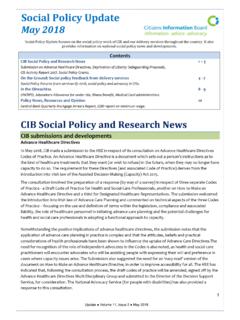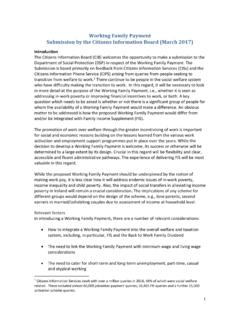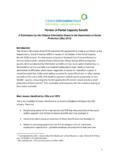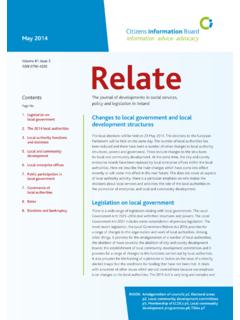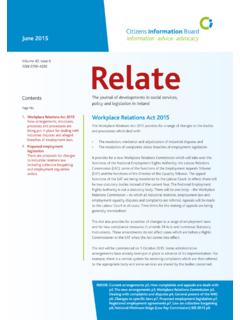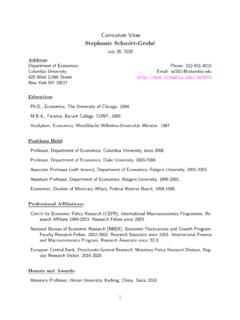Transcription of April 2016 Volume 43: Issue 4 ISSN 0790-4290 Relate
1 April 2016 . Volume 43: Issue 4. Relate ISSN 0790-4290 . Contents The journal of developments in social services, policy and legislation in Ireland Page No. 1. Assisted Decision-Making Assisted Decision-Making (Capacity) Act 2015. (Capacity) Act 2015. The Assisted Decision-Making (Capacity) Act 2015 provides a statutory framework New arrangements, procedures for individuals to make legally-binding agreements to be assisted and supported in and structures under the Assisted Decision-Making making decisions about their welfare and their property and affairs. This assistance (Capacity) Act 2015 are and support is particularly required where the person lacks, or may lack, the described such as Assisted capacity to make the decision unaided. Decision-Making, Co-Decision-Making, Advance A number of new arrangements are covered by the Act, including Assisted Healthcare Directives, Wards of Court and the Decision Decision-Making and Co-Decision-Making. A process is also set out for the Support Service.
2 These changes court to appoint a Decision-Making Representative for an individual. Advance are not in effect yet as the Act Healthcare Directives are introduced into law for the first time. has not been commenced. As well as introducing new decision-making procedures, the Act sets out new arrangements for Wards of Court and for people who wish to make an Enduring Power of Attorney. A Decision Support Service is to be set up within the Mental Health Commission to provide a range of functions in relation to the new arrangements. The Assisted Decision-Making (Capacity) Act 2015 was enacted on 30 December 2015 and is due to be commenced by Ministerial Order during 2016 . The Minister for Justice and Equality will, in consultation with the Minister for Health, review the functioning of the Act before 2021. Capacity For the purposes of the Act, capacity for decision-making is defined as the ability to understand, at the time the decision is being made, the nature and consequences of the decision in the context of the available choices.
3 INSIDE: C. apacity p1, Assisted Decision-Making p2, Co-Decision-Making p2, Registration of a Co-Decision-Making Agreement p3, Decision-Making Representative p3, Wards of Court p4, Enduring Powers of Attorney p5, Advance Healthcare Directive p6, Refusal of treatment p6, Ineligible or disqualified people p7, The Decision Support Service p7, Offences under the Act p8. page 2 Relate April 2016 Citizens Information Board The Act sets out a functional test for the assessment of a Assisted Decision-Making person's capacity. This functional approach to the definition Where a person considers that their capacity is in question of capacity allows for changes in a person's capacity over or may shortly come into question, that person may time. A person lacks the capacity to make a decision if they appoint a Decision-Making Assistant (for example, a family are unable: member or carer) to assist them to access information or to understand, make or express decisions about their welfare To understand the information relevant to the decision and property and affairs.
4 To retain that information long enough to make a voluntary choice The Decision-Making Assistant will not make the decision To use or weigh that information as part of the process on behalf of the person. Any decision that is made will be of making the decision, or taken as having been made by the person only. The Assistant To communicate their decision should make every effort to ensure the relevant decisions are implemented accordingly. However, a person should not be said to lack capacity if they: The appointment of such a Decision-Making Assistant is done by way of a formal Decision-Making Assistance Require information to be explained to them in a way Agreement. The Minister for Justice and Equality will that is appropriate to their circumstances prescribe the formalities involved in making such an Can only retain the relevant information for a short Agreement, including the form of notice to be given to the period of time Director of the Decision Support Service.
5 Did lack capacity for a particular decision at one time but may no longer lack capacity to make that decision A Decision-Making Assistance Agreement may be revoked Lack capacity for some decisions but have capacity to at any time by either party, or changed at any time with the make decisions on other matters consent of both parties. The guiding principles of intervention A Decision-Making Assistance Agreement will automatically become invalid if the Agreement relates to a decision which In the Act, an intervention is defined as any action done or is covered by any of the following: court order made under the Act in respect of someone who may or who does lack capacity a relevant person . A Decision-Making Order A Decision-Making Representation Order The Act sets out guiding principles that are intended to A Co-Decision-Making Agreement safeguard the autonomy and dignity of the person with An Advance Healthcare Directive (and the person now impaired capacity.)
6 There is a presumption that the person lacks capacity). has decision-making capacity unless the contrary is shown. An Enduring Power of Attorney made by the person No intervention should take place unless it is necessary and which has entered into force unless all practical steps have been taken without success to help the person make the relevant decision themselves. Anyone can make a complaint to the Director of the Decision Support Service (see page 7) concerning a In addition, any act done or decision made under the Act Decision-Making Assistance Agreement or the performance must be done in a way that minimises restrictions on the by a Decision-Making Assistant of their duties under the person's rights and freedoms of action and gives effect, as Agreement. much as possible, to the past and present will and preference of the person. Co-Decision-Making Where a person considers that their capacity is in question, Types of intervention or may shortly come into question, that person may appoint To respond to the range of support needs that people may someone else to jointly make with them one or more have, the Act provides for three types of decision-making decisions about their welfare and property and affairs.
7 Supports. These are: A suitable Co-Decision-Maker is defined in the Act as a Assisted Decision-Making relative or friend with whom the person has a relationship of Co-Decision-Making trust built up over a period of personal contact and that the Decisions by the court or by a Decision-Making Co-Decision-Maker is able to perform the duties of the role Representative appointed by the court (see page 3). Citizens Information Board Relate April 2016 page 3. The fact that the decision(s) are made jointly by the person Any Attorney for the person and the Co-Decision-Maker is the primary difference Any Designated Healthcare Representative for the person between a Co-Decision-Making Agreement and a Any Co-Decision-Maker of the person under another Decision-Making Assistance Agreement. Under a Co-Decision-Making Agreement. Decision-Making Assistance Agreement, the decision(s). in question are made by the person only. Anyone may object to the registration of a Co-Decision- Making Agreement by lodging their objection with the The appointment of a Co-Decision-Maker is done in writing Director of the Decision Support Service within five weeks in a Co-Decision-Making Agreement.
8 The Agreement must of the notice of application being given. Anyone with a be executed in much the same way as a will for example, legitimate interest may inspect a registered Agreement. with two witnesses signing the Agreement. The Director will review each Agreement on the register on the first anniversary of the Agreement and then at The role of a Co-Decision-Maker intervals of three years. The Co-Decision-Maker must file a The role of a Co-Decision-Maker is to assist the person to report with the Director every year. This report will describe obtain all necessary information regarding the decision what they have done during the period in relation to their or decisions to be made, to explain the nature of any functions as a Co-Decision-Maker including details of all decision(s), including discussing any alternatives and likely transactions relating to the person's finances which are outcomes, and to establish the will and preferences of within the remit of the Co-Decision-Making Agreement.
9 It the person as much as possible. The Co-Decision-Maker must also contain details of any costs and expenses paid to will make relevant decision(s) jointly with the person, and and claimed by the Co-Decision-Maker. The report must be make reasonable efforts to ensure that the decision(s) are approved by the person prior to filing. implemented as far as practicable. The terms of a Co-Decision-Making Agreement may be A Co-Decision-Maker is entitled to have their expenses changed with the consent of both parties and the approval reimbursed from the assets of the person where any fair and of the Director. A registered Co-Decision-Making Agreement reasonable costs associated with performing the role are may be revoked at any time, either wholly or in part, by properly vouched. These details must be included in a report either party. Any revocation must be notified to the Director submitted to the Director of the Decision Support Service and the register updated accordingly.
10 Every year (see page 4). A Co-Decision-Maker is not entitled to be paid for the role. Any Co-Decision-Making Agreement will be invalid if it includes any provision for the disposal of the person's Registration of a Co-Decision-Making Agreement property by way of gift. A Co-Decision-Making Agreement must be registered with The Director of the Decision Support Service must be the Director of the Decision Support Service (see page 7) informed by the Co-Decision-Maker or any other person within five weeks of signing. The Agreement does not come who becomes aware that the person's capacity has either: into force until it is registered. Deteriorated to such an extent that they lack capacity Once a Co-Decision-Making Agreement is registered, a in respect of the relevant decisions, even with the decision made within the scope of the Agreement cannot be assistance of a Co-Decision-Maker, or challenged on grounds that the person lacked capacity. On Improved to the extent that they have full capacity the other hand, any decision specified under the Agreement in respect of the relevant decisions is invalid if it is not made jointly by the person and the Co-Decision-Maker.
